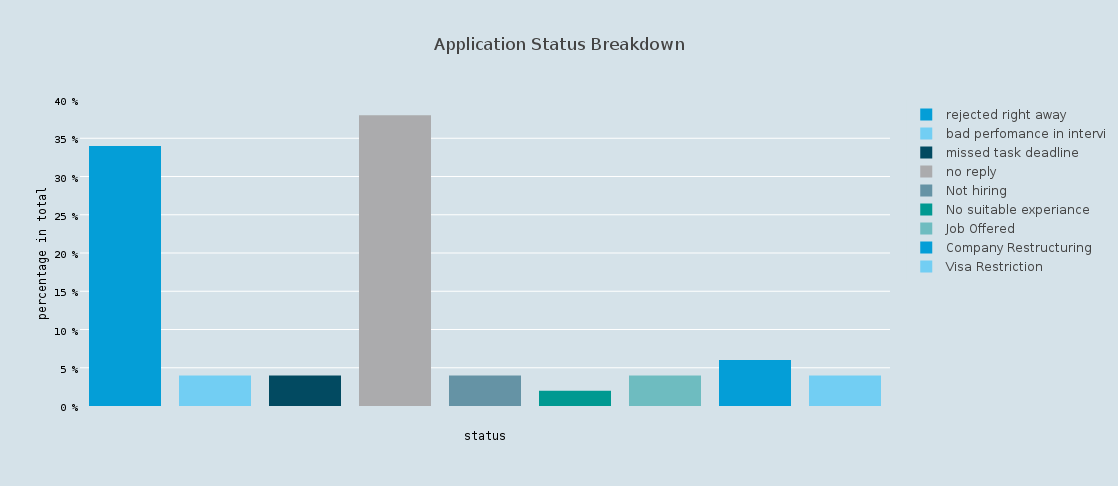3.7 KiB
layout, title, date, comments, categories
| layout | title | date | comments | categories | ||
|---|---|---|---|---|---|---|
| post | Finding a programming job | 2016-03-31 17:01 | true |
|
TL;DR My learning from job hunting as a programmer.
Sometime ago I decided that I need a change of scenery and decided to look for new gigs.
My current job is my first real job after university. Looking back, now that I've more experience of the hiring process, I feel landing it was ridiculously easy ! So you can see job hunting is a quite new territory for me. This is in no way a definitive guide for finding a job; merely my experience.
I've couple of friends who insist it's a sellers market - but there are lot more variables that are at play.
The first obvious approach was to apply to all the companies I care about. Fill up the forms in https://company.com/careers. Turns out this is far from truth. Almost no one replied, so I started scouring job boards.
Here is the data from my experiments
I did my due diligence before applying to these companies, reading the job description thoroughly, googling a bit about the engineering, etc. Even then, the conversion rate to an interview is really really small. Most of the organisations don't reply at all.
This are the things I picked up from my efforts -
Write a good cover letter.
This is really important if you are applying via email. In the beginning, my cover letters were mostly focused on my interest in the position and organisation with resume which talked about the profile and work experience. The moment I started moving more info into the cover letter, response rate increased. Its OK if you end up duplicating information, try to cram more info onto the letter without increasing the word count much.
Also, be very open about your status, if you'd need sponsorship for VISA, mention it in the beginning itself, saves time for both you and the organisation.
Automate all possible things
Nobody has time to write a billion emails and manage regular work, so automate them. In my case I separated my cover letter into parts that are common and specific to a position.
Then I wrote a small script that reads the email and the specific bits from an spreadsheet and sends out application emails.
Use the network
This is so far the best option to search for a job. Friends can give you a direct connection to a prospective employer. Also, conversion rate is really huge because the recommender often has a good idea about job and the candidate.
Find a real person
The job descriptions usually is too generic and most times there'll be hidden requirements. Find a direct contact in the company and ask about their current stack, engineering workflow and exact needs. This person can also turn out to be your biggest ally in the process.
Get a good calendar application
Interviews mean lots of meetings spanned across multiple time zones, so add everything to a calendar and stick to it. Pay extra attention to time zone conversions.
Get over with rejection
There are plenty of reasons to get rejected, and it may not be anything you control. Maybe the company is going through a restructuring, maybe the position is no longer available or the all time favourite VISA restrictions.
Important thing is to get feedback so that you can fix all possible issues. Interviewers are generally hesitant to give feedback. But there is no harm in asking.
thanks @technikhil, @imdonatello, @tsudot and @_gsin_ for reading the draft.
